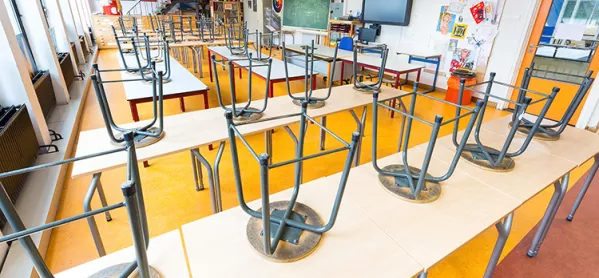It is the end of the summer term 2017. The final assembly has been delivered. The students have been ejected from the premises. And you have made your way to the warm, crowded staffroom.
You have wished goodbye to leaving staff and sat through interminable speeches while sipping warm wine from a plastic cup. The most sinister, domineering of managers have euphemistically eulogised over the highs and lows of your colleagues’ careers and they, while clutching an oversized greeting card and a bottle of wine, have said how much they will miss you all while holding back tears.
It is nearly time to go the local pub with your comrades who you will not see for six weeks, or to go home to your family who are finally about to see enough of you for six weeks. But before you do, you take a few quiet moments to revisit your classroom. Your classroom.
This desk where you marked essays until your wrists hurt and your biro ran out of ink. The bottom shelf, where you tend to stash your pay cheques. The same pay cheques that have become a conversation piece for the media to argue about every time common wisdom suggests you are paid too much or too little.
These walls that you have covered with displays that will encourage a love of your subject and create visual cues for those students who still have trouble remembering the key terminology.
These seats that your students have known as “my seat”, thanks to the seating plan you drew up last September to ensure that there was a suitable arrangement of kids based on gender and ability. These tables you have walked around while children have wrestled with the topics you have guided them through and grown as individuals because you expect the best of them.
This computer screen on which you read the “Ofsted is coming” email. Or the “This is a polite reminder that data entry is due in by the end of today” email. Or the “Why did you have the audacity to suggest my child isn’t getting an A*?” email.
Or, most nefarious of all, the “Can you stop by my office for a quick chat at lunchtime?” email.
This clock that you see as your key source of competition. If they are looking at you, or the activities you have set, and not your clock, then you are winning.
This projector that you make wheeze into life every morning, upon which you have conjured up images and notices and extracts and annotations and sample answers and diagrams and revision advice and mark-schemes.
This patch of floor at the front of the classroom where you have explained what a metaphor is, or the difference between left-wing and right-wing, or the features of a plant-cell, or the significance of a reality television star becoming the president of the US.
These piles of exercise books full of evidence that, yes, your students know more than they did ten months ago, because you came in every day and did your job.
That blind spot in the corner of the room that you can’t see through the window where, more often than you want to admit, you had to cry when it was all too much for you this year. Incidentally, it is the same spot that people who are observing your lessons tend to sit in, isn’t it?
Take this last moment before the holidays and look back on everything you have done.
Think back on every late night you spent marking, every time you had to keep calm amid the chaos and every time you had to go above and beyond the terms of your contract because you put your students before anything else.
Look at the door that you have waited by at the start of every lesson, holding it open and greeting your students by name while checking their uniforms and silently assessing the emotional states of the students you know are going through a difficult time this year.
It’s time now, hold it open for yourself and walk into six-weeks’ holiday well earned.
Phil Brown is a writer and English teacher from South London
Want to keep up with the latest education news and opinion? Follow Tes on Twitter and like Tes on Facebook.




